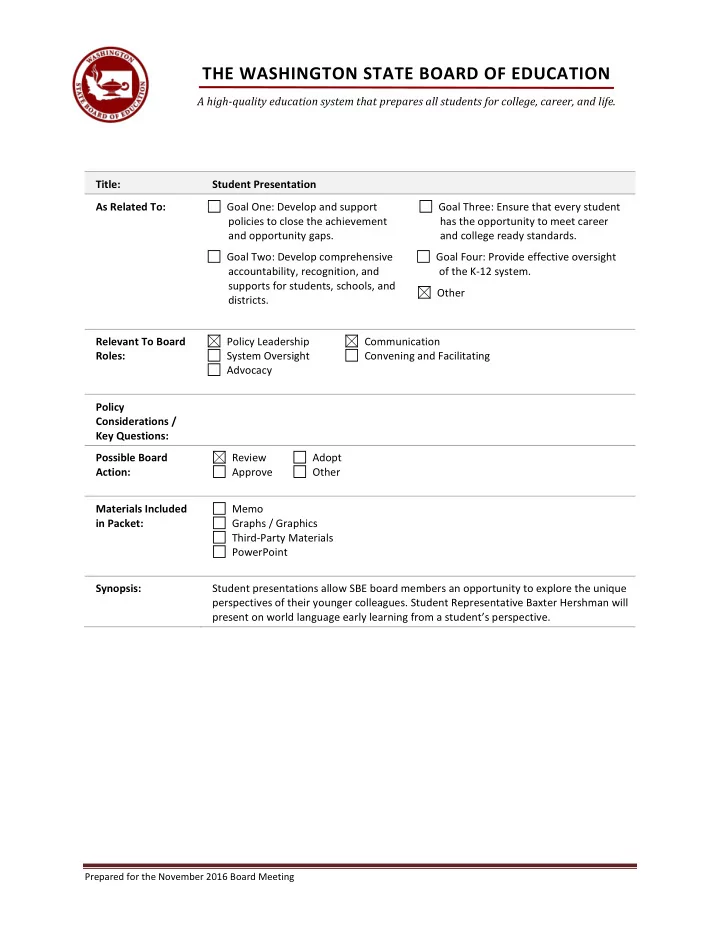

THE WASHINGTON STATE BOARD OF EDUCATION A high-quality education system that prepares all students for college, career, and life. Title: Student Presentation As Related To: Goal One: Develop and support Goal Three: Ensure that every student policies to close the achievement has the opportunity to meet career and opportunity gaps. and college ready standards. Goal Two: Develop comprehensive Goal Four: Provide effective oversight accountability, recognition, and of the K-12 system. supports for students, schools, and Other districts. Relevant To Board Policy Leadership Communication Roles: System Oversight Convening and Facilitating Advocacy Policy Considerations / Key Questions: Possible Board Review Adopt Action: Approve Other Materials Included Memo in Packet: Graphs / Graphics Third-Party Materials PowerPoint Synopsis: Student presentations allow SBE board members an opportunity to explore the unique perspectives of their younger colleagues. Student Representative Baxter Hershman will present on world language early learning from a student’s perspective. Prepared for the November 2016 Board Meeting
World Language in Early Education By Baxter Hershman
Student Update Senior year College applications Closing out my last season of football Planning senior trip I will be applying for a job this coming winter Numb to the “Plans for next year?” questions Realizing how little time is left
World Language in Washington Common Practices in our state Little exposure to world language prior to high school New requirements create room for these classes to be taken Gives students understanding but not mastery of the language The Best Age to Learn a Second Language
World Language Around The World Majority of European countries require foreign language studies Starting as early as age three Sometimes requiring more than one language Students have mastery of the language and gain awareness of other cultures Learning a Foreign Language a 'Must" in Europe, Not So In America
The Problem With Our System
We teach kids at Students have a harder time learning a second language later too old of an age in life
Why It Is Easier the Younger You Are Learning languages is part of a young child’s brain chemistry Foreign language education is simplified Similar to any subject, you learn the basics first which are easier to master Children are less self-conscious Learning a Second Language Is Easier for Children, But Why?
The Science Behind It There is a critical time for language learning This period begins to diminish as early as 11 months of age but lasts until age 7 As you learn your first language it becomes harder to learn another Your brain recognizes patterns of one and disregards another Unraveling How Kids Become Bilingual So Easily
Personal Experience Timeline Age 3 through 6 Enrolled in a private school that required Spanish class everyday Age 7 through 9 Private tutoring with a variety of teachers Age 10 through 13 No foreign language education Age 14 through present day I have been enrolled in Spanish classes ever since
Personal Benefits of Early World Language Education
Why It Is Necessary Students who learn second languages at an early age are less likely to be distracted by outside stimuli Learning a Second Language Is Good Childhood Mind Medicine, Studies Find
Why It Is Necessary Cont. Provides a widened perspective of the world Instills empathy for other cultures Helps students find the value in differences of people
Why It Is Necessary Cont. Culture is taught along with the language Shows how people around the world live Some of the most profound learning experiences come from studying cultures
Why It Is Necessary Cont. Students are able to create personal connections through the use of a second language Able to have experiences that otherwise would not have existed
Why It Is Necessary Cont. Economic advantages to knowing a second language Employees that can speak more than one language are seen as valuable to many employers Speaking more than one language increases the likelihood of earning more money Do Multilingual Individuals Earn More Money?
138 Million The number of Spanish speakers estimated to live in the U.S. by the year 2050 Nearly one third of the U.S. population US Now Has More Spanish Speakers Than Spain - Only Mexico Has More
Practical Board Applications Advocate for early world language education Show best practices
Conclusion Students should be taught world language at early ages Gives students opportunities Sets them up for success Our current system does not allow for true mastery of foreign languages We are behind the rest of the world
Thank You
Questions?
Recommend
More recommend